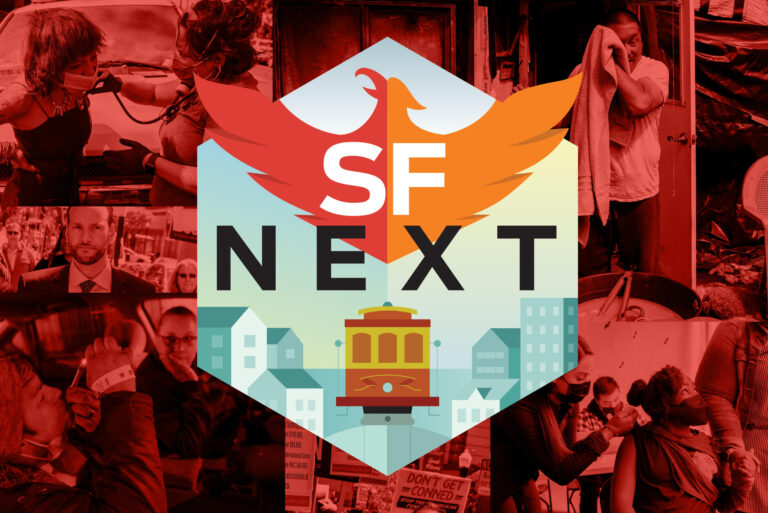
Joe and Fi run a small coffee shop on the first floor of our San Francisco Chronicle building at Fifth and Mission streets. For decades, they have been as much a part of The Chronicle as any journalist, even letting regulars run a tab on their lunch purchases of panini and handmade Spam musubi. But since the pandemic began, almost all of the tab-running customers have been happier working from home than coming downtown, inadvertently damaging a beloved business.
As our city is imperiled by pandemic shock waves, growing homelessness, a persistent drug-addiction problem, rampant income inequality, concerns about crime and safety, and the fissures left from two recall votes, I worry about Joe and Fi, and about so many other hardworking people in San Francisco. If they can’t survive, what will the city become?
With those concerns in mind, today we are making public a Chronicle initiative called SFNext, a project aimed at finding solutions to historic problems that have grown even more acute since March 2020.
Throughout our 155-year history, The Chronicle’s news and opinion pages have reported on what we find to be broken in the city, with the expectation that shining a light on a problem can get it fixed. We will continue to do that. But I think all of us in the city can agree that it’s time for new thinking, for collaborative, creative and workable solutions driven by input from our diverse populace.
For the past several months, SFNext has brought together groups of city residents from all neighborhoods and walks of life. Together we have been exploring why one of the richest, most innovative cities in the world struggles to solve its most pressing issues.
What we have heard: People are frustrated. Many are angry. Among the most telling observations:
• “The city lacks a way to solve its problems. There is no inclusive policy process by which stakeholders are gathered for deep thought that results in solutions.”
• “One person’s solution to a problem in San Francisco is another person’s reason the problem exists.”
• “It’s like everyone is trying to hold on to their own turf and nothing gets done.”
• And from an exhausted small-business owner: “It is unbearable out here.”
So what’s next? Our plan is to hold more conversations in a series of public events throughout our city. These discussions and related findings — along with our own reporting, which begins today with an expansive look at San Francisco’s troubled downtown — will appear on multiple platforms. SFNext will produce a new podcast series, create moderated social media channels and publish editorials and resident viewpoint columns, among other features.
We intend to seek out and assess good ideas that are being deployed in cities around the globe. A weekly email newsletter will provide updates and offer opportunities to get involved.
The idea of “solutions journalism” has been around for decades, much of it done to limited effect. We are taking a different approach. We will soon launch a major poll of city residents, in partnership with Stanford University Professor Jon Krosnick, one of the nation’s foremost polling experts, to ask for your views on what’s happening in the city. Your responses will drive public discussions and inform our journalism.
Once we have identified a set of possible solutions to what you tell us are San Francisco’s most urgent problems, we will poll again to see which of those solutions you support and report on those findings. Our hope is that when city leaders devise public policy changes, they will seriously consider the solutions you favor.
As we undertake this effort, we recognize that in our history, The Chronicle has been, at times, too close to those in power, and to those with racist or otherwise exclusionary policies. While we cannot rewrite the past, we can strive to make sure those mistakes are not repeated. This must be an inclusive process.
SFNext will focus first on San Francisco, but our hope is to expand its reach to other communities around the Bay Area. Many of the problems our city faces are also regional or statewide. It will require working in concert with both the state and the federal government to develop holistic solutions.
We understand this will not be easy. Most people we have spoken to so far believe the challenges the city faces will only get more difficult.
But there is still optimism. Despite our troubles, this remains one of the most desirable places in the world to live. We have an incredibly smart and wonderfully diverse population, a powerful philanthropic community, smart activist movements that were founded here, and some generous local companies, all determined to make things right.
SFNext presents us all with a challenge: Can we compromise on our individual preferences and think about what’s best for the city as a whole? If we can, we may have a chance to do what San Francisco did when it was severely tested in 1906 and 1989. Only this time, the city’s renaissance will have to be for everyone, not for a powerful few.
Joe and Fi, and the rest of our neighbors, need our help. Let’s go.
For this project to work, we need you and we need your ideas. We’re looking for solutions. Please email me at [email protected] and follow the project on Twitter @sfnext.